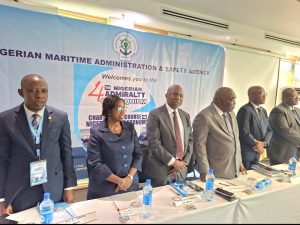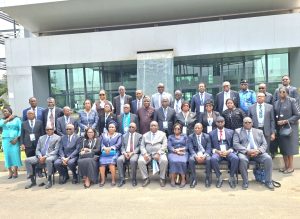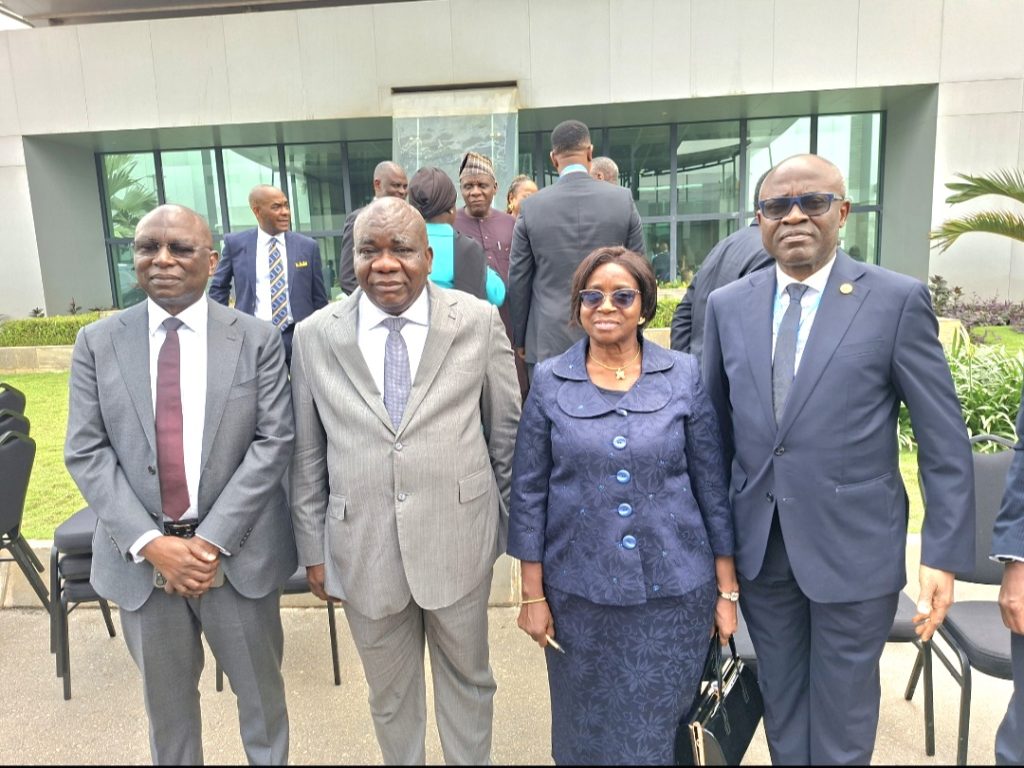By DAPO OLAWUNI
The Chief Justice of Nigeria (CJN) Justice Kudirat Kekere-Ekun has tasked the Nigerian judiciary system to provide the needed legal framework to support Nigeria’s Blue Economy growth, adding that the judiciary, though not a direct participant in maritime trade or resource exploitation, occupies a pivotal role in ensuring that the framework supporting the Blue Economy is founded on law, order, and justice.

Justice Kekere-Ekun gave the charge on Wednesday at the 4th Nigerian Admiralty Colloquium held at the Legend Hotel, Ikeja Lagos, organised by the Nigerian Maritime Administration and Safety Agency (NIMASA) in collaboration with the National Institute of Advanced Legal Studies (NIALS), with the theme; “Charting the Course for Nigeria’s Blue Economy”
The colloquium brought together Justices from the Supreme Court, Court of Appeal, and Federal High Court, alongside maritime administrators, legal scholars, and industry experts.
The CJN who was represented at the Colloquium by Justice Emmanuel Agim, stressed the need for the judiciary to continously be updated on admiralty laws and conventions, adding that a judiciary equipped with the competence to handle maritime disputes in the blue economy assures both local and foreign investors of legal certainty.
According to her, this certainty is a cornerstone of establishing Nigeria as a maritime hub in West Africa and beyond.
“Harnessing the full benefits of Nigeria’s maritime endowment faces persistent challenges, including illegal, unregulated, and unreported fishing; oil theft and pipeline vandalism; piracy and armed robbery against ships; environmental degradation; weak regulatory enforcement; and inadequate judicial understanding of maritime and admiralty law.
“There is a need to continuously engage with relevant stakeholders to surmount these challenges. Indeed, establishing a sustainable and efficient blue economy requires an integrated institutional response, supported by a judiciary that is not only independent but also knowledgeable and agile in handling maritime-related disputes.
“Commerce thrives where the rule of law is strong, where disputes are resolved efficiently, and where judicial interpretation provides clarity and predictability. Our courts are the custodians of maritime jurisprudence — from the enforcement of contracts for carriage of goods by sea, to issues of marine insurance, ship arrest, pollution control, piracy, and now, emerging frontiers such as offshore renewable energy and marine biotechnology.
“Notably, the maritime sector is unique due to its transnational nature, the speed of commercial transactions, and the technical complexity of disputes. Admiralty matters often require specialised knowledge, comparative legal appreciation, and familiarity with international conventions. It is therefore incumbent upon us, as the custodians of the jurisprudence, to possess a firm grasp of maritime law principles, both domestic and international, and to apply them in a manner that fosters confidence in Nigeria’s maritime legal environment.

“Nigeria’s legal framework governing maritime activities is rooted not only in domestic legislation such as the Nigerian Maritime Administration and Safety Agency Act, the Admiralty Jurisdiction Act, the Cabotage Act, the Merchant Shipping Act, and environmental statutes, but also linked to international instruments such as: The United Nations Convention on the Law of the Sea (UNCLOS); MARPOL Convention on marine pollution; SOLAS on safety of life at sea; and various conventions of the International Maritime Organization (IMO) to mention but a few.
“Considering that the blue economy gives rise to complex maritime disputes revolving around intricate contractual, commercial, environmental, and jurisdictional issues, it is of utmost importance for judges to possess extensive knowledge in interpreting maritime contracts, charter party agreements, bills of lading, insurance instruments, and international shipping protocols.
“A judiciary equipped with the competence to handle maritime disputes in the blue economy assures both local and foreign investors of legal certainty.
This certainty is a cornerstone of establishing Nigeria as a maritime hub in West Africa and beyond.
“Moreover, as the Federal Government takes steps to advance the blue economy through initiatives to develop port infrastructure, expand shipping capacity, and enhance coastal tourism, the judiciary must provide the legal framework that supports such growth” the CJN stated
Justice Kekere-Ekun further stated that in charting the course of Nigeria’s blue economy, Court Judges must reflect on on how the courts can better serve the maritime sector by ensuring that Admiralty cases are handled expeditiously and by judges who possess both legal expertise and commercial understanding; encouraging the use of Alternative Dispute Resolution (ADR) mechanisms, such as arbitration and mediation, which are vital in maritime commerce and by promoting judicial education and specialization in maritime and environmental law, as is practiced in advanced maritime jurisdictions.
In his welcome address earlier, the Director General of NIMASA, Dr Dayo Mobereola stated that Nigeria’s Blue Economy prosperity requires all hands on deck, including the judiciary.
He said “Nigeria’s blue economy requires an “all hands on deck” approach, with the Judiciary as a crucial actor, where interpretation of legal instruments and case decisions remains a vital tool for the sustainable development of Nigeria’s blue economy”
Continuing, the NIMASA DG said the Agency is working tirelessly to secure and advance Nigeria’s blue economy through continuous development of strategies, approaches and mechanisms that balance economic and sectoral growth.
According to him, some of the key initiatives includes; the review and update of existing regulatory frameworks in alignment with global best practices; ratification and domestication of key IMO and ILO Conventions and Protocols; and enhancement of maritime safety and security through the Deep Blue project, which secures Nigerian waters.
Also speaking on the rule of law as a compass, Hon. Justice John T. Tsoho, Chief Justice of the Federal High Court, represented by Hon Justice Olayinka Faaji,
reaffirmed the court’s constitutional mandate in admiralty matters. He emphasized that the Blue Economy, spanning shipping, marine tourism, fisheries, and ocean energy is Nigeria’s next frontier.
He therefore called for judicial foresight, precision, and alignment with international protocols.
He said “Our judges must be abreast of global best practices. This colloquium is vital for continuous judicial education”
He also stressed the importance of efficient dispute resolution in attracting foreign direct investment (FDI).
“Investors need confidence that their assets and contracts are protected by a predictable and sophisticated legal system. The rule of law is the compass guiding the success of Nigeria’s maritime sector.”
In his contribution, the National Judicial Institute (NJI) Administrator, Justice Babatunde Adejumo speaking on “Admiralty Law Demands Specialized Understanding” underscored the complexity of admiralty law, which intersects international conventions, environmental regulation, and commercial contracts.
“Maritime disputes are not conventional. They involve charter parties, bills of lading, marine insurance, and cross-border claims. Judges must be equipped to navigate these waters.” Adejumo explained.
He praised the colloquium as a rare forum for cross-sector dialogue, promoting consistency in judicial reasoning and enhancing Nigeria’s maritime governance.


























